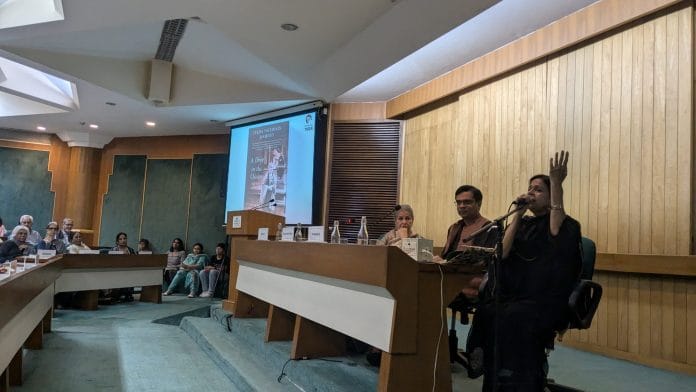New Delhi: A panel discussion at the launch of Syeda Hameed’s memoir A Drop in the Ocean at the India Habitat Centre appeared like a 75-minute-long reading session that saw the author and coordinator quoting heavily from the book every few minutes. The discussion didn’t move beyond the experiences in the book despite it raising the issues with contemporary relevance such as the Ganga-Jamuni tehzeeb and racism in the West.
The panel discussion with Hameed, featuring social activist Aruna Roy and Oxfam International executive director Amitabh Behar highlighted how the author’s experiences of Islamophobia in India and racism in Canada gave “beginning to my life and my quest for the Ganga-Jamuni tehzeeb”. She also mentioned how going to New Delhi’s Modern School, which she referred to as “the Ganga-Jamuni tehzeeb School” helped her heal from the trauma of those experiences.
Behar described the book as a “chronical of the Ganga-Jamuni tehzeeb, the ethos of new India”.
The Gulmohar Auditorium at the IHC was packed almost entirely with an elderly audience. Among the crowd of about 200, there were many senior hijab-clad Muslim women. Many seemed to have known Hameed personally as they hugged like old friends before and after the event.
The book launch began with a Hindustani classical performance of Ghalib’s poem Ishrat-e Qatra Hai Darya Mein Fana Ho Jaana (To Mingle with the Ocean is the Ecstasy of a Drop), by a young singer, Yusra Naqvi. The meaning of this poem — that just as the joy of a water drop is to merge into the ocean, a lover’s misery can end in extreme pain that can also be a form of pleasure or cure — is hinted in the title of Syeda’s memoir. It is an allegory to Syeda’s life, her quest for the Ganga-Jamuni tehzeeb.
Behar pointed at that in the first chapter of the memoir, Hameed talks about her father’s time in Aligarh Muslim University (AMU) and how he disagreed with Muhammad Ali Jinnah’s appeal that Muslims must organise themselves on communal lines. Hameed has juxtaposed this event later in the chapter with how the Hindu Jagran Manch in 2018 appealed to Hindus to organise on communal lines. When Behar asked Hameed to reflect on this juxtaposition, the author agreed, saying, “You really grabbed the thread,” to stress on the importance of the Ganga-Jamuni tehzeeb.
“This current runs through this Ganga-Jamuni tehzeeb. My first experience, when I was nine years old, staying in Sujan Singh Park (New Delhi), I was always hesitant to tell my name. When people would ask, I would mumble. But at some point, it became very difficult, so I had to say my name. And that’s when the children refused to play with me because I had a Muslim name. This was my first trauma,” she added.
Also read: Gone but not forgotten—Delhi keeps its date with Majrooh Sultanpuri, Madan Mohan golden hits
Painful memories
Hameed recalled her experience facing racism in Canada when she contested city council election as a South Asian woman in an “ultra-conservative part of Canada; something which was unbelievable” at the time. The author described it as a “rollercoaster ride”. She also referred to an incident in which her car broke down near a school and children threw coins and sandwiches at her, yelling: “Paki go back!”
About her work with the National Commission for Women (NCW), Hameed recalled a case she had worked on that involved a young Muslim couple who had eloped. The entire community had risen against them because they were from different “gothras”.
“We confronted them and said that there is no ‘gothra’ in Islam. But they shot back at us saying, ‘Don’t teach us our Islam!’ We got the Supreme Court verdict, the two could get married…but then the brother of the girl; her name was Maimoon, and the boy’s name was Idrees–I can never forget their names till my dying day–it happened in front of my eyes; he shot the girl,” Hameed said. The elderly audience at IHC gasped.
Poetry with Khushwant Singh and Faiz
Discussing the presence of various “teachers” in her life, Hameed recalled her literary mentor Khushwant Singh and how he was so inspirational in her journey.
“Khushwant loved poetry — that is something we shared,” she said. He encouraged her and “forced” her to write and translate Musaddas-e Hali, a book by her ancestor, Altaf Hussain Hali.
“When Khushwant asked me to translate Musaddas-e Hali, which was a wake-up call for Muslims, I said I cannot do it. Then he said, ‘If I can do Shikwa and Jawab-e Shikwa by Muhammad Iqbal, you can do Musaddas-e Hali, and you can drive it!’ And I did it!”
When a member of the audience asked Hameed whether she had any hopes for Hindu-Muslim unity in India, the author’s response was philosophical yet hopeful.
“It’s a very loaded question. Main yehi keh sakti houn, ke jab ambar jhoom ke naache ga, dharti nagmein gaaye gi, woh subah kabhi nah kabhi aaye gi…(When the sky will sway, earth will sing, that fateful morning will inevitably arrive).”
The event closed with the performance of Faiz’s Hum Dekhenge by a semi classical singer, Rene Singh. The audience sang along.
(Edited by Humra Laeeq)







This is a story where a Muslim man killed a Muslim woman for her choice. So why is the title and author talking about Ganga Jamuni Tehzeeb? Focus on regressive attitudes and entitlement in certain sections of society. Hum dekhenge apni hypocrisy.
As far as Ganga-Jamuni tehzeeb is concerned, it’s best to quote Sudhanshu Trivedi –
“Ganga bhi humari aur Jamuna bhi hamari, par tehzeeb tumhari?”
Indian Muslims invoke the concept of the Ganga Jamuni tehzeeb but never care to actually practice it in their personal lives. They just want other communities, especially Hindus, to uphold the “tehzeeb”. When it comes to their own community, everything goes for a toss.